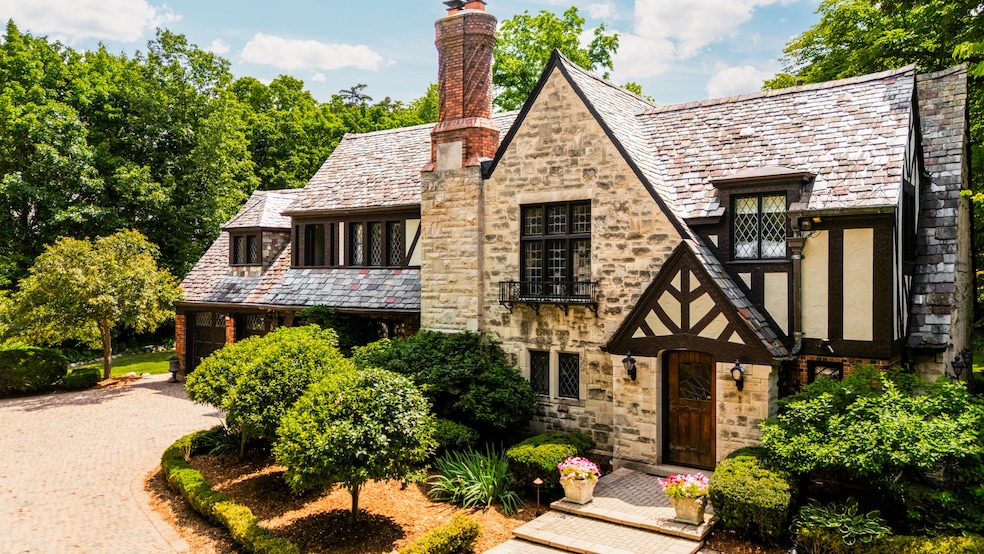This nearly 100-year-old Tudor Revival home for sale was designed to embody merry old England, not its actual locale of Ann Arbor, Michigan.
Built in 1927, the home’s exterior appears largely untouched and straight from a storybook: A stone-clad, tall front-facing gable, multicolored slate roof, a twisting brick chimney, and decorative textured metal placed to mimic timber beams for that medieval look.
The architectural style gained popularity in Ann Arbor between 1910 and 1940, according to the city. Large homes built in the Tudor Revival style sought to mimic the pastoral peace residents thought England had, and as a result, many Ann Arbor streets with these style homes were given English names: Kensington, Manchester, and, where this home resides, Devonshire.
While the exterior has an old-world charm, inside, 2010 Devonshire Road has been upgraded with some award-winning details by the current owner, interior designer Tiffany Birch of Birch Design Associates. The 6,904-square-foot home is listed for $2.28 million. It has four bedrooms, four full bathrooms and two half bathrooms.
Sometimes a seller can run into broader market challenges despite any type of redo. The home was listed initially in April 2024 at $3.49 million before relisting most recently in June for $2.39 million. It underwent a price cut to $2.28 million in August and is now less expensive than when purchased in 2021 for $2.3 million.

Upgrading and maintaining original details
Birch purchased the home in 2021 from two longtime homeowners who fixed crumbling original details, such as the thousands of panels of leaded glass.
According to a past interview with local media, a glazier counted 3,300 diamond-shaped glass panes that he re-leaded with new zinc.
In that time, those former homeowners also added a 41-foot-high round glass conservatory in the back of the home and dug the basement larger to fit a wine cellar, humidor room, pub-style bar, and home office with burlwood built-ins.

Several of the leaded glass windows also show a crest with a sheep suspended by a ribbon, though no homeowner, or listing agent Stephanie Flood of Howard Hanna, has been able to track down the home’s history. The same emblem is found carved into stone above a second entry door. Sheep often symbolize religious piety, but the suspended sheep can also refer to the Order of the Golden Fleece, a Christian order for chivalry, or simply a symbol of high-quality wool, as it's used in clothing brand Brooks Brothers' logo.
The first homeowners, according to 1928 city directories, were Chester M. and Margaret Powell. Chester was the president of Powell & Co., a real estate investment firm.
Award-winning design
When designer Birch purchased the home, she chose to maintain the majority of original details, such as the wooden ceiling beams, tile flooring, hand-hewn woodwork, limestone fireplaces, arched entryways and curved doors.
“She remodeled the kitchen and primary suite but has touched every other surface in the home, and it is really beautiful,” said Flood. “She has won two design awards for the home.”
The Detroit Design Awards, a local contest presented by Detroit Design magazine, recognized the home’s music room and pub. The music room uses original tile flooring from Detroit Pewabic Pottery, one of the oldest continually operating potteries in the country. It also features a limestone fireplace and blue-painted built-in bookcases. The “Use of Color” winner, the pub, is drenched in lacquer blue paint with crocodile-skin-printed wallpaper and black coffered ceilings.

The remodeled kitchen features deep evergreen and ivory Dutch-made custom cabinetry with walnut interiors, brass inserts and quartzite countertops. The butler’s pantry includes additional storage and custom cabinets. That pantry room flows into the conservatory that includes two mini-split HVAC systems and custom drapery.
“What I love about it is it is very classic, and the updates that have been done pay homage to the classic style,” said Flood.

Flood attributed a softened Ann Arbor market to its largest employer, the University of Michigan. Most buyers at this price point in the area, according to Flood, work in higher education, a sector threatened with reduced funding under the Trump administration.
"People involved in research are kind of holding off right now. There's sort of indecision on the part of buyers. There's hesitancy not knowing how their jobs are going to go," said Flood.
Homes in the Tuomy Hills subdivision of Ann Arbor Hills, where the house sits, have an average value of $1.31 million, according to Homes.com.
The priciest sale of the year so far in Ann Arbor was for a 12,387-square-foot home with six bedrooms and 10 bathrooms that sold for $3.28 million in July after 127 days on the market.

